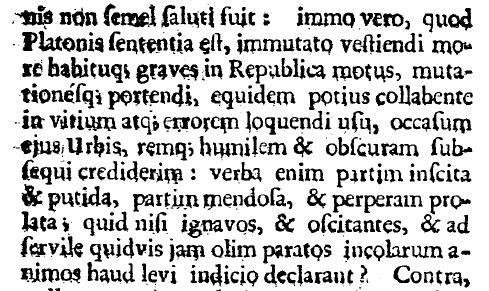January 19, 2007
Scholarship is hard, let's go drinking
As Geoff Pullum just pointed out, Christopher Orlet's recent American Spectator piece "Among the intellectualoids" is a "standard-issue English-going-to-hell rant". Orlet himself, a columnist for Vocabula Review, turns this stuff out by the yard. For a lovely example of the genre's low intellectual standards, consider this passage from his "Grammar for Smarties", The American Spectator, 1/11/2005:
Indeed, the battle cry of the language liberal might be, "Languages change. Get over it." Most linguists judge that language change is neither good nor bad, and, anyway, resistance is futile. Languages, like hemlines, will change whether we want them to or not. This indifference to standards is reflected in the latest editions of our popular dictionaries in which words that are commonly misspelled (alright) or misused (disinterested) have been given the lexicographer's stamp of approval.
Yet despite all this talk of transformation the mother tongue has gone remarkably unchanged since the King James Version of the Bible began to stabilize the language in the mid-seventeenth century. Words come and go, yes, but a letter written 367 years ago by John Milton to Benedetto Bonomatthai reads much like one composed by a good writer today:
I am inclined to believe that when the language in common use in any country becomes irregular and depraved, it is followed by their ruin or their degradation.
But what John Milton actually wrote in Florence on September 10, 1638, was
... equidem potius collabente in vitium atque errorem loquendi usu, occasum ejus Urbis, remque humilem & obscuram subsequi crediderim ...
At least, that's how it was published in Joannis Miltonii Angli, Epistolarum familiarium liber unus quibus accesserunt, ejusdem, jam olim in collegio adolescentis, prolusiones quædam oratoriae, Londini : Impensis Brabazoni Aylmeri, 1674, which is available in digital form from Early English Books Online. While we're at it, let's reproduce the full and more eloquent sentence from which this fragment was taken by a 19th-century translator mindful of his audience's reduced attention span:
Neque enim qui sermo, purusne an corruptus, quaeve loquendi proprietas quotidiana populo sit, parvi interesse arbitrandum est, quae res Athenis non semel saluti fuit: immo vero, quod Platonis sententia est, immutato vestiendi more habituque graves in Republica motus, mutationesque portendi, equidem potius collabente in vitium atque errorem loquendi usu, occasum ejus Urbis, remque humilem & obscuram subsequi crediderim: verba enim partim inscita & putida, partim mendosa, & perperam prolata, quid nisi ignavos, & oscitantes, & ad servile quidvis jam olim paratos involarum animos haud levi indicio declarant?
Here's an image that includes the crucial fragment:

(The whole letter in .pdf form is here.)
The version that Chris Orlet quoted was composed in the middle of the 19th century, and published in The Prose Works of John Milton: With a Biographical Introduction by Rufus Wilmot Griswold. In Two Volumes (Philadelphia: John W. Moore, 1847). Volume II: Familiar Epistles, Translated from the Latin, by Robert Fellowes, A.M. Oxon. (Fellowes' text is reproduced here.)
Chris continues:
Often there is good reason to be skeptical of change, particularly when it comes about out of laziness and the dumbing-down of grammar rules. Again, compare Fowler's inflexible 1926 Dictionary of Modern English Usage to current grammars like Woe is I, in which rules that are troublesome or too difficult to remember are pronounced outdated or dead. (Rats, if I had known this was possible in my college days I would have pronounced Algebra outdated and dead and gotten on with my binge drinking.)
Stop by and see me in Philly any time, Chris, and I'll buy you a round.
[Note that this is not the first example of questionable linguistic scholarship that we've observed in The American Spectator, a publication generally better known for fervor than for footnotes. See "Slurry" (11/24/2006) and "Slurry Accent II" (11/27/2006).]
Posted by Mark Liberman at January 19, 2007 08:23 AM